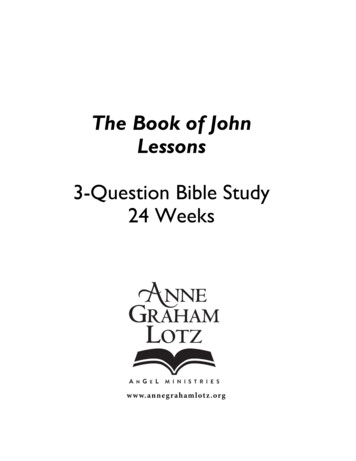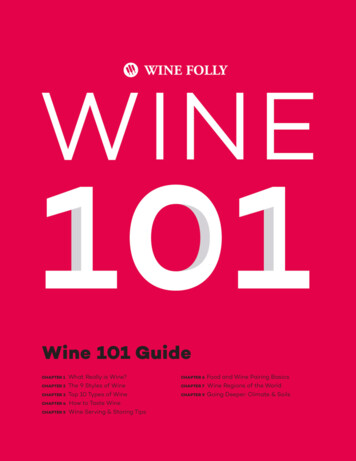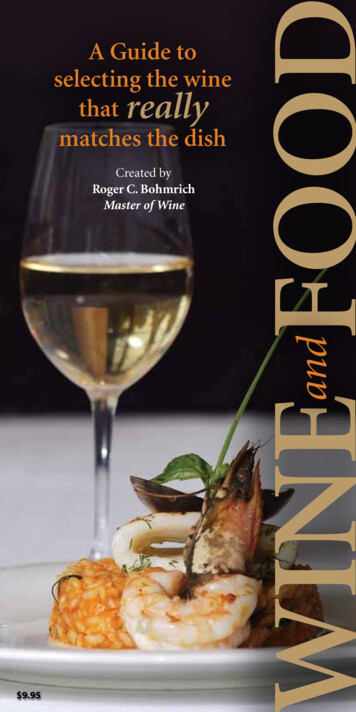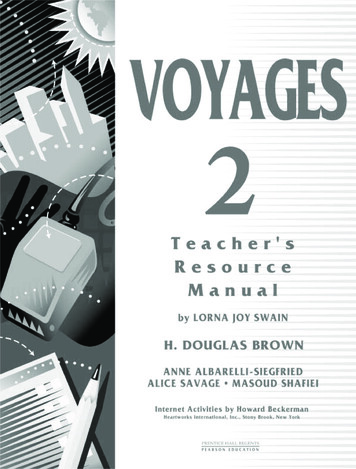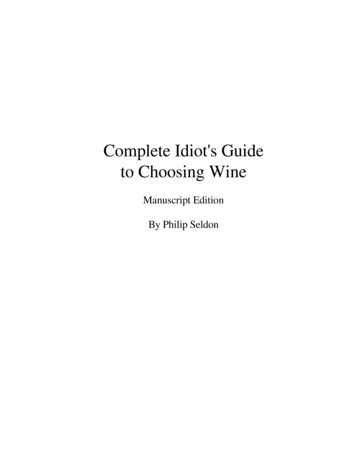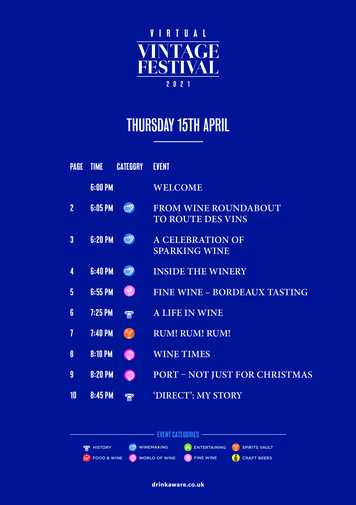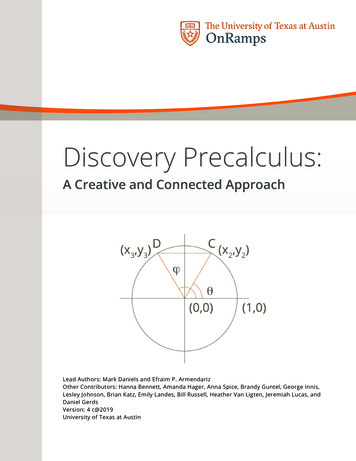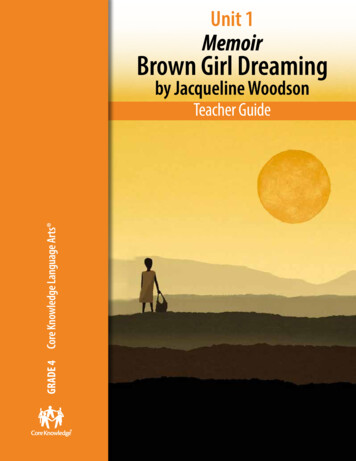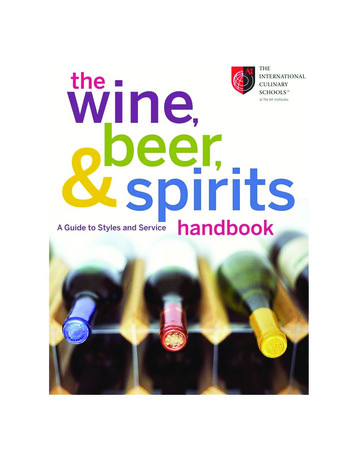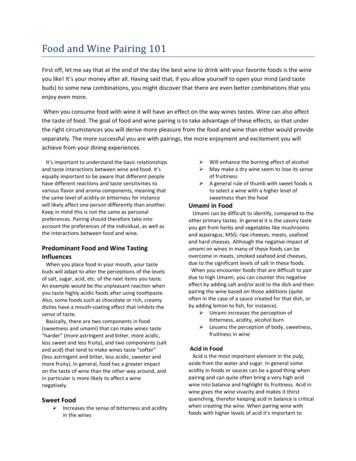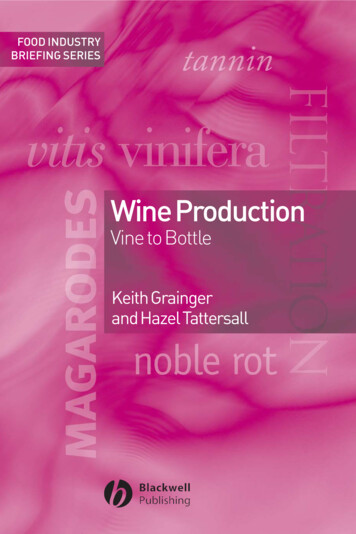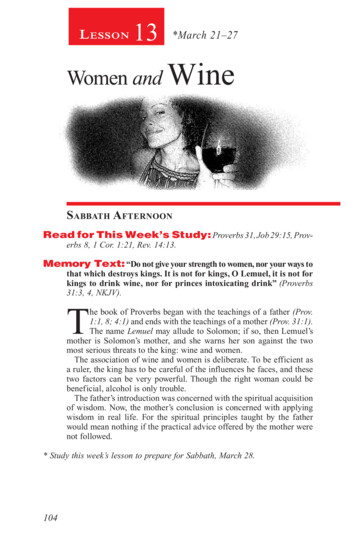
Transcription
L esson13*March 21–27Women and WineSabbath AfternoonRead for This Week’s Study: Proverbs 31, Job 29:15, Proverbs 8, 1 Cor. 1:21, Rev. 14:13.Memory Text: “Do not give your strength to women, nor your ways tothat which destroys kings. It is not for kings, O Lemuel, it is not forkings to drink wine, nor for princes intoxicating drink” (Proverbs31:3, 4, NKJV).The book of Proverbs began with the teachings of a father (Prov.1:1, 8; 4:1) and ends with the teachings of a mother (Prov. 31:1).The name Lemuel may allude to Solomon; if so, then Lemuel’smother is Solomon’s mother, and she warns her son against the twomost serious threats to the king: wine and women.The association of wine and women is deliberate. To be efficient asa ruler, the king has to be careful of the influences he faces, and thesetwo factors can be very powerful. Though the right woman could bebeneficial, alcohol is only trouble.The father’s introduction was concerned with the spiritual acquisitionof wisdom. Now, the mother’s conclusion is concerned with applyingwisdom in real life. For the spiritual principles taught by the fatherwould mean nothing if the practical advice offered by the mother werenot followed.* Study this week’s lesson to prepare for Sabbath, March 28.104
S unday March 22A Toast “To Life”?In many cultures, drinking alcohol is associated with living a goodlife. People raise a glass and wish one another a long life, though theirony is that each glass works toward destroying life. Nicely designedbottles, poetic and funny drinking songs, clever commercials, and evensome “scientific” findings all comfort drinkers in their idea that alcoholis good for them. Proverbs has already warned us against this deadlydeception (Prov. 23:30–35). Now the theme reappears, showing us evenmore damage that drinking can bring.Read Proverbs 31:4, 5, 8, 9. Together, what do they say, and how doestheir message apply to every follower of the Lord, not just the king?In similar language, Job describes himself as being “eyes to the blind,and . . . feet to the lame” (Job 29:15, NKJV). Likewise, the king orthose with means should help support the poor and the needy—thosewho are “speechless” in that they don’t have a voice because no onelistens to them.The destructive effect of wine can also be seen in how it can so easilydistort one’s judgment. While alcohol is bad enough for common folk,for a king or someone with power, alcohol can create terrible situations.The drinking king not only “forgets the law” and does not know whatis right, but he subsequently issues distorted judgments: the guilty aredeclared innocent, and the innocent guilty.What is at stake here is the capacity to discern between right andwrong, good and evil. The prohibition of wine drinking has to do withbasic wisdom and, as such, should apply to every human being. It isnoteworthy that this concern is precisely the reason implied in thespecial prohibition of drinking for the priest: “that you may distinguishbetween holy and unholy” (Lev. 10:9, 10, NKJV).Who hasn’t seen the devastating effects of alcohol in so manylives? How can you help others, especially the young, stay clear ofwhat can bring only harm to them and to others?105
M onday March 23A Toast “To Death”Read Proverbs 31:6, 7. How are we to understand these texts?A quick reading of these verses gives the impression that Lemuel’smother allows the consumption of wine or any other alcohol for theperson who is about to die (vs. 6) or for the person who suffers fromdepression (vs. 7). This reading, however, would contradict not only theimmediate context—Lemuel’s mother has just warned the king againstwine drinking—but also the general context of the book of Proverbs,which systematically and emphatically prohibits wine drinking.In addition, it hardly makes sense to offer something to the perishing that would only make their health and well-being worse. And giving alcohol to a depressed person is like giving salt to someone whois already dehydrated. If, as we know, God cares about our bodiesand our health, it doesn’t make sense to see these texts, especially incontext, encouraging the use of alcohol.More important, an analysis of the use of the expression “who isperishing” in the book of Proverbs reveals that it is speaking aboutthe wicked (Prov. 10:28; 11:7, 10; 19:9; 21:28; 28:28). Through theexpression “who is perishing,” Lemuel’s mother points in fact, byassociation, to the wicked. As for the expression “bitter of heart,”it refers to the depressed person (Prov. 31:6, NKJV), who, like thewicked, becomes insensitive and “forgets” poverty (vs. 7).“Satan gathered the fallen angels together to devise some way ofdoing the most possible evil to the human family. One propositionafter another was made, till finally Satan himself thought of a plan.He would take the fruit of the vine, also wheat, and other things givenby God as food, and would convert them into poisons, which wouldruin man’s physical, mental, and moral powers, and so overcomethe senses that Satan should have full control. Under the influenceof liquor, men would be led to commit crimes of all kinds. Throughperverted appetite the world would be made corrupt. By leading mento drink alcohol, Satan would cause them to descend lower and lowerin the scale.”—Ellen G. White, Temperance, p. 12.106
T uesday March 24A Virtuous Woman“Who can find a virtuous woman? for her price is far aboverubies” (Prov. 31:10).Who is the “virtuous woman” of Proverbs 31:10? A number of indications suggest that the author has more in mind than a godly woman orthe ideal wife. Following the lead of many passages of the book (Prov.1:20–33, 3:13–20, 4:5–9, Proverbs 8), we have good reason to thinkthat “the virtuous woman” represents wisdom. This personification ofwisdom as a woman is justified not only because the Hebrew word for“wisdom,” chokmah, is a feminine noun but also because it allows theHebrew writer to draw all kinds of concrete lessons for our daily life.Wisdom is not pictured as some lofty and unreachable ideal but as avery practical and approachable woman who could become our lifecompanion.This last teaching about wisdom is given through a beautiful acrosticpoem: each verse begins with a Hebrew letter following the alphabeticorder, as in the book of Lamentations and in many psalms.Compare the text on wisdom in Proverbs 8 with our text on the“virtuous woman.” What features of the “virtuous woman” remindus of wisdom in the book of Proverbs?1.2.3.4.5.6.She is precious and worth finding (Prov. 31:10, 8:35).Her worth is more than rubies (Prov. 31:10; 8:10, 11, 18, 19).She provides food (Prov. 31:14, 8:19).She is strong (Prov. 31:17, 25; 8:14).She is wise (Prov. 31:26, 8:1).She is praised (Prov. 31:28, 8:34).Though we live in the so-called information age, and though we haveacquired so much more knowledge than had previous generations, there’slittle to indicate that our generation is any wiser than previous generations. Indeed, as Martin Luther King Jr. said, “We have guided missilesand misguided men.”Read 1 Corinthians 1:21. What does it say to you, and how canthis idea help you live by faith?107
W ednesday March 25She WorksThe virtuous woman in Proverbs 31 is not lazy; she works hard andis very active. The poem insists on this quality (Prov. 31:27), whichcharacterizes the wise versus the fool (Prov. 6:6; 24:33, 34). The fieldof her activities is comprehensive and concrete. To be spiritual does notmean that we should be idle, all under the pretext that we are concernedwith highly important religious issues, and thus do not have time totake care of “trivial” matters. (See Luke 16:10.) The woman “willinglyworks with her hands” (Prov. 31:13, NKJV). It is interesting that thisvery spiritual person is never depicted praying or meditating. She isshown only as an efficient and productive woman, like Martha of theGospels (Luke 10:38–40).Read Proverbs 31:12, 15, 18. Why is the woman always working?The woman works “all the days of her life” (vs. 12), even during thenight (vs. 15, 18). Her active and watchful presence is effective all thetime. The reason for her constant attention is her responsibility.Read Proverbs 31:20, 25. What is the temporal scope of her projects?Here we touch on an important point regarding our work and effort:it will be tested by time. Only the future will testify to the quality ofour deeds. To work wisely is to work with the future in mind, not justfor an immediate reward.Though not quite dealing with the same thing, the principle in the following text from Revelation is so important: “Blessed are the dead whichdie in the Lord from henceforth: Yea, saith the Spirit, that they may restfrom their labours; and their works do follow them” (Rev. 14:13).If you have a special woman (a wife, mother, family member,teacher, boss, or friend) in your life, what can you do to showyour appreciation for her and for all she has done for you?108
T hursday March 26She CaresRead Proverbs 31:26–31. What other important characteristics areseen in this woman? Why are these important for all of us, regardless of who we are?As we have seen all through this quarter, an emphasis is placed onwords, on what we say. The woman is known for her wisdom and forher kindness. They are related. After all, couldn’t one argue that kindness is another form of wisdom, especially when we understand thatwisdom isn’t just what we know but what we say and do?Notice, too, the phrase the “law of kindness.” That is, kindness isn’tjust some fleeting attribute that escapes from her mouth now and then.It is a law, a principle of her very existence. How powerful it would beif the “law of kindness” were to guide all that came out of our mouths.Read Proverbs 31:30. What important point is revealed here that is sooften forgotten?All too often women are rated only in terms of outward appearance;that’s such a shallow and superficial marker. The Bible points out justhow “vain,” how empty, that kind of attitude ultimately is. This woman’strue beauty is found in her character and how that character is mademanifest in her life and works. Beauty will always pass away; charactercan endure forever. “A great name among men is as letters traced insand, but a spotless character will endure to all eternity.”—Ellen G.White, God’s Amazing Grace, p. 81.In what areas of your life do you need to see your characterimprove? Praying about it is fine, but what concrete positivesteps must you take in order to see growth?109
F riday March 27Further Study: “When indulging their appetite for wine andwhile under its exciting stimulus, their reason was clouded, and theycould not discern the difference between the sacred and the common.Contrary to God’s express direction, they dishonored Him by offeringcommon instead of sacred fire. God visited them with His wrath; firewent forth from His presence and destroyed them.”—Ellen G. White,Testimonies for the Church, vol. 3, p. 295.“Let the children and youth learn from the Bible how God has honored the work of the everyday toiler. . . . Let them read . . . of thewise woman described in the Proverbs, who ‘seeketh wool and flax,and worketh willingly with her hands;’ who ‘giveth meat to her household, and their task to her maidens;’ who ‘planteth a vineyard,’ ‘andstrengtheneth her arms;’ who ‘stretcheth out her hand to the poor; yea,. . . reacheth forth her hands to the needy;’ who ‘looketh well to theways of her household, and eateth not the bread of idleness.’ Proverbs31:13, 15, R.V.; 31:16, 17, 20, 27.”—Ellen G. White, Education, p. 217.Discussion Questions: Why is total abstinence from alcohol the only right option?After all, what possible good can arise from any kind of alcoholconsumption? On the other hand, think about all the damage thatit often causes. Dwell more on the idea that although we have a lot of knowledge for our time, we don’t necessarily have more wisdom. In whatways can knowledge without wisdom be even more dangerousthan a lack of knowledge without wisdom? What are some recentexamples we can see of just how damaging knowledge withoutwisdom can be? Review the characteristics of the “virtuous woman.” How canthe principles behind what is revealed in this specific situation beapplied to believers, whatever their gender, marital status, or age? The book of Proverbs is filled with practical wisdom. Thisshould tell us that our religion, even with all its lofty theology andspiritual dimensions, has a very practical side to it, as well. Howcan we make sure that we don’t neglect the practical aspects offaith as we seek to fulfill its theological and spiritual dimensions?110
Storyi n s i d e“Sabbath Shoes”Becky needed a new pair of shoes. Going to her favorite shop nearNewport Beach, California, she picked out a pair but discovered her sizewasn’t in stock.Dwight McKeever, the sales rep, assured her that her size could beordered, and the shoes would be in by Wednesday afternoon.Becky returned on Wednesday, but the shoes hadn’t arrived. On Thursday,still no shoes. When Becky came into the shop late Friday afternoon,Dwight explained that the delivery truck hadn’t arrived but would any timesoon. Becky waited a few more minutes, but then said she had to go. Fifteenminutes after she left the store, the shoes arrived.Quickly phoning Becky’s home, Dwight left a message. Sometime later,she returned his call, explaining that she would wear her old shoes the nextday and pick up the new ones on Saturday night.Just a few minutes later, Becky returned to the store. “I just came to letyou know that I’m not angry that the shoes didn’t arrive on time and thatI’m very impressed with all you’ve done to help solve this problem.” Thenshe turned to leave.“But what about your shoes?” Dwight asked. “I’ll get them tomorrownight,” came the response as Becky walked out the door. Thinking thatmaybe she needed money, Dwight offered her a loan, but money wasn’tthe problem. Frustrated, Dwight couldn’t understand what the problem was.Finally Becky explained, “I’m a Christian. I want to honor God on theSabbath.”“Sabbath?” The only Sabbath Dwight knew of was the rock group BlackSabbath.“I’m a Christian too,” he told her, “but what does that have to do withbuying shoes?”“If you’re a Christian,” she replied with a smile, “then you know that theTen Commandments tell us to keep the Sabbath holy and that means weshouldn’t buy or sell.”Intrigued, Dwight wanted to learn more. Becky invited him to aRevelation Seminar being held nearby, and he accepted. “I had picked upthe Bible a few times and wanted to know how it would all end, so I wentstraight to the last book but couldn’t understand a thing,” he recalls. “Therewas a beast with all these heads, but I wasn’t too worried because I knewwith nuclear warfare we could just blow up all those heads.”When he told that to Becky, she laughed. “You might want to come to theseminar and learn what it’s really all about.”To see how Becky’s faithfulness led Dwight and many of his family toaccept Bible truth, continue reading the story in Mission magazine, for firstquarter 2015, or online at www.adventistmission.org/mqa-home.Produced by the General Conference Office of Adventist Mission.Web site: www.AdventistMission.org111
2015Bible Study Guide for the Second QuarterLuke, a Gentile convert and doctor, directed his Gospel accountto Greek and Gentile members of the community of faith whilenot disregarding the Jewish roots of Jesus. Luke presents Jesus,the Son of man, as the Savior of the world and friend of humanity.We will study his account in our second quarter 2015 study guide,entitled The Book of Luke by John M. Fowler. The universalityof salvation is the underlying theme of his Gospel, and so Luke’sgenealogy traces Jesus all the way to Adam and links Him to God.Luke’s Gospel is the largest in the New Testament, and it containssix miracles and 13 parables that are unique to its account. Sometheologians have recommended the book of Luke as a good biography of our Lord Jesus. So as a world church, the book of Luke willbe the focus of our study for second quarter 2015.Lesson 1—The Coming of JesusThe Week at a Glance:Sunday: “An Orderly Account” (Luke 1:1–3, Acts 1:1–3)Monday: “Call His Name John” (Luke 1:13–17)Tuesday: “Call His Name Jesus” (Luke 1:31)Wednesday: The Manger of Bethlehem (Luke 2:7)Thursday: The Witnesses to the Savior (Luke 2:25–32)Memory Text—Luke 1:37, NKJVSabbath Gem: Luke’s readers must stand in awe and wonder atthe fact that Jesus is real, and that through Him, God has invaded history with the “ ‘Savior, who is Christ the Lord’ ” (Luke 2:11, NKJV).Lesson 2—Baptism and the TemptationsThe Week at a Glance:Sunday: Prepare the Way of the Lord (Luke 3:1–14)Monday: “You Are My Beloved Son” (Luke 3:21, 22)Tuesday: Not by “Bread Alone” (Luke 4:4)Wednesday: “Worship Me” (Luke 4:5–8)Thursday: Christ the Victor (Luke 4:9–13)Memory Text—Luke 3:22, NKJVSabbath Gem: Jesus was baptized and received the benedictionof Heaven that He is God’s “beloved son” (Luke 3:22) and began Hisministry at the time when the Roman Empire was being ruled bygreat historical dignitaries.Lessons for the Visually Impaired The regular Adult Sabbath SchoolBible Study Guide is available free each month in braille and on audio CD to sightimpaired and physically handicapped persons who cannot read normal ink print. Thisincludes individuals who, because of arthritis, multiple sclerosis, paralysis, accident,and so forth, cannot hold or focus on normal ink-print publications. Contact ChristianRecord Services for the Blind, Box 6097, Lincoln, NE 68506-0097. Phone: 402-4880981; e-mail: info@christianrecord.org; Web site: www.christianrecord.org.112
(Proverbs 31:3, 4, NKJV). T. he book of Proverbs began with the teachings of a father (Prov. 1:1, 8; 4:1) and ends with the teachings of a mother (Prov. 31:1). The name . Lemuel. may allude to Solomon; if so, then Lemuel's mother is Solomon's mother, and she warns her son against the two most serious threats to the king: wine and women.
